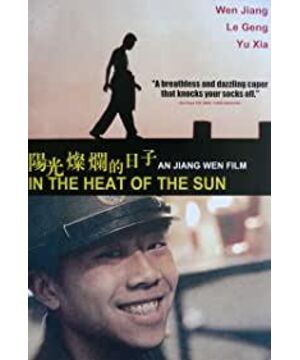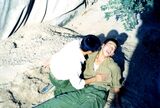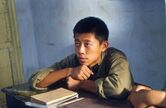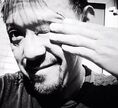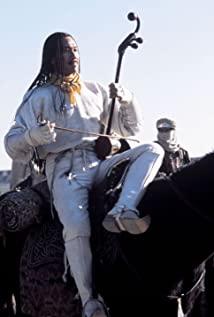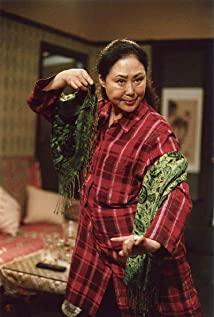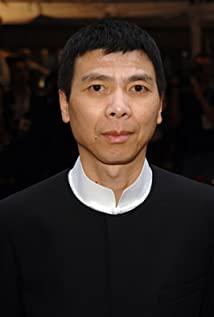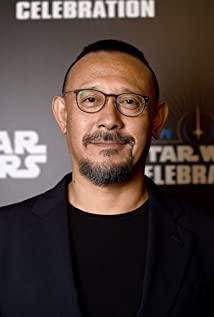Jiang Wen has only directed 6 films in 26 years, and the output is really not high. In terms of quality, at least the first 4 films are not controversial, and each film corresponds to a book. The film in this issue is "Sunny Days". (hereinafter referred to as "Sunshine"), the book is "Birth · The Birth of a Movie".
Jiang Wen is excellent as an actor, I don't need to elaborate on this. "Sunny Days" released in 1994 was his directorial debut, and it was an instant hit, with a long list of winners. He also won the annual "Top Ten Best Films in the World" in 1995 by the American "Time" magazine. , Movie lovers probably know that 1995 was a year of classics, and Chinese movies have never been on this list, which is of great significance.
"Sunshine" is adapted from Wang Shuo's novel "Ferocious Animals". Who is Wang Shuo? Like Jiang Wen, he is a student of the army courtyard. He became popular earlier than Jiang Wen. When I was young, in the early 1990s, the streets were full of his books, and he also made a cameo in a movie. The film's degree of reduction to the original is quite high on the surface, and even many lines are the same, but after watching the film, you will find that the spiritual core is very different from the original. This kind of adaptation style of changing the core in a reserved form has been maintained until Jiang Wen's later in the works.
What story does this movie tell?
In the early 1970s, a group of children in the military compound had nothing to do all day, skipping school, fighting, and slapping their wives (chasing girls).
Ma Xiaojun has a special "hobby", that is, unlocking with a key. He said that he is not a thief because he never steals anything, but just likes to experience a different life in other people's houses.
By chance, Ma Xiaojun found a photo of a girl in someone else's house and was deeply attracted. Later, he knew that the girl was called Milan, who was a few years older than him.
He likes Milan and tries to get close to her, but Milan is detached from this younger "brother" and gets together with the tall and handsome Liu Yiku. Ma Xiaojun gets jealous, fights with Liu Yiku, and then tries to rape him. Milan failed, and was finally spurned by the friends.
What's the point of this story? Some people say that "Sunshine" is a reflection of an era, but that's what the film critics said, but Jiang Wen didn't say that. The story takes place in the early 1970s, during the WG period, what the adult world is like, we can perceive from other films of the same period, such as "Farewell My Concubine" and "Alive".
Compared with the depression of these two films, "Sunny Days" is a heartless carnival. If you think from an adult's point of view, you will feel that this is unreal.
The film is completely interpreted from the perspective of a child, and its connotation is also a small person in a big era, specifically an emotional experience in adolescence, or a first love. The movie just presents those details of life truly, and can feel what is the audience's own business.
Looking through some movie reviews on the Internet, almost all of them are describing the story, using all kinds of gorgeous rhetoric to retell the plot of the movie, and then they are talking about political metaphors. I understand that "Sunny Days" is not because its "story" is very good, and I don't think Jiang Wen is trying to philosophize to enlighten the world. The good thing about this movie is the way of storytelling, which is the camera, lines and music. , performance, etc., are technical things. Watching Jiang Wen's films, the "story" has to be ranked last. There is a reason for him to do this.
In one issue of Jiang Wenshang's Round Table Party, he talked about representing China to go abroad to participate in film festivals, and found that foreign films, even if they were not very good, were very good in terms of pictures, music and other technical things, while domestically produced films were very good. The movies that made him didn't seem to be spiritual, so he thought that when he made a movie, he had to make something energetic.
Camera language
Now that we know that we are focusing on technology, let's start with the lens. The lens mentioned here is actually a general statement, which should be the "lens language", including the design of the sound and so on.
Jiang Wen is very good at absorbing the expression techniques of good movies. He is not a simple tribute, but he has worked hard to study and turn the essence of a good shot into his own.
For example, the young Ma Xiaojun was lying on the window and peeking at a few little girls dancing. The split shot is similar to Noodles peeking at Deborah dancing in "Once Upon a Time in America".
In a young age, Ma Xiaojun and his friends threw schoolbags in a competition, and the schoolbag fell into a clever transition, and Ma Xiaojun grew up. This transition is similar to "2001 A Space Odyssey", where the primitive man threw a bone into a spaceship, condensing hundreds of thousands of years of human development history.
In front of the mirror, Ma Xiaojun pretended to force himself to scold the police, just like Robert De Niro's performance in "Taxi Driver".
There was a group fight under the Lugou Bridge. When the two sides were negotiating tensely, a train passed over the bridge, suppressing the voices of speaking, creating a very tense atmosphere. This is similar to the rumbling sound of the train when Mike shot the enemy in "The Godfather", an extremely good sound design.
Many examples like this can be found in Jiang Wen's movies. If you watch enough movies, there will be many surprises of finding easter eggs when watching Jiang Wen's movies. But the whole film is not fragmented, but a very complete whole, and each tribute paragraph fits well with the plot of the film. This is what Jiang Wen said. Some people can't understand it now , but he will understand it in the future .
Music is the soul of film
The influence of music on people is amazing, and we don't know why, we will always remember the music of a certain movie clip.
The climax at the end of "Sunshine", the music used is the Italian opera "Country Knight" interlude. This interlude was also used by Martin Scorsese at the beginning of "Raging Bull". The boxer played by Robert De Niro throws punches and jumps in the ring alone. This music lays the foundation for the whole film. The tone - loneliness.
When Jiang Wen edited "Sunshine", he always used "Country Knight" as the keynote. The core of the movie and "Raging Bull" are the same. The superficial stories are all trivial and violent, and it is a struggle to get rid of some kind of control. But the real core is deep loneliness. Ma Xiaojun hangs out with his friends every day. In fact, he is lonely in his heart. Even though his first love for Milan is actually a sexual sprouting in adolescence, due to lack of guidance, he grows wantonly and becomes possessive. There is no love at all.
Why Jiang Wen is often "misread", I also give an example of music. The music used in Ma Xiaojun's fight with the clappers is "The Internationale". I once thought it was a metaphor. This was also suggested to be revised by the official, indicating that the official interpretation also has this meaning. But after reading Jiang Wen's book, I realized that the reason for using this piece of music was that there was no TV at all at that time, and the streets and courtyards were all broadcast by loudspeakers. So Jiang Wen just restored the image in his memory, because we thought too much.
script and lines
The original book has about 60,000 words, while the movie script has 90,000 words, which is very meticulously adapted.
Of course, the lines are also the skill of the script. Just like the attempted rape of Ma Xiaojun in the play, Milan asked him, do you think it is so powerful? Ma Xiaojun replied: "vigorous", the lines of this film are very "vigorous" as a whole, which is different from any previous domestic movies.
Of course, there are also delicate things. The line that Ma Xiaojun's mother scolded him was very delicate. Siqin Gaowa is an old artist, and this scene is the only one who played his acting skills in the film. We can know the basics of this family with a few lines. condition. My father is a senior army cadre who has been out for many years to perform tasks, and my mother used to be a literate person. This combination has political factors and is a common pattern of army marriage in the early days of the founding of the People's Republic of China. These are actually in the original book.
When it was raining heavily, Ma Xiaojun cried and confessed to Milan. The first sentence was "Milan, I like you", but Milan pretended not to hear clearly, and the second time he said, "My car fell into the ditch", I really can't laugh or cry. The sentence perfectly expresses the impulsive and cowardly character of the horse monkey.
Of course, if you read the original book and then watch the movie, you will find more of it. For example, in the original book, Ma Xiaojun's rape was successful, the line was "you deserve it", and the movie was changed to "attempt". If we must look for the connotation behind the story, Wang Shuo's words do have a feeling of "criticizing the times", while Jiang Wen's portrayal of Ma Xiaojun is more lonely and powerless, and the reflection of the times is more profound.
Behind the scenes from the book
"Sunny Day" shot 250,000 feet of film, setting a record for the use of film in a domestic film. How are these films used?
After the fight, the actors took a bath in the bathhouse more than 30 times. Ma Xiaojun was washed with water and peeled off. Xia Yu took the Venice Best Actor for the first time in a movie. Chu Yuan was mistakenly remembered as the best actor in Cannes), he is not any acting genius, this award is ground.
The tranquil photo was also taken on film, and one of the four films of about 23,000 frames was selected for printing.
The photographer is Gu Changwei, who once warned Jiang Wen: "If you shoot like this, many of them will be cut out"! Jiang Wen also admitted that he "hated" Gu Changwei for saying that. He never considered the cost of creating Jiang Wen, but the consequences were also very serious. Due to the huge investment in the early stage, the "Sunshine" crew ran out of ammunition and food several times and almost died. .
Watching the movie alone may think that Jiang Wen is a "genius" and a "ghost". He was so good when he first made a movie. Only after reading the book did he realize that the key to success is seriousness, persistence and attention to detail. Don't say that Jiang Wen can't tell stories. He plays music, text, and camera shots. His films are literary and artistic films with unique styles. Therefore, for a seemingly simple story, we can only seem to be enthusiastic and unfinished, and after the end, we always feel that there is something behind it.
So Jiang Wen's film has become a legend, so some people will say "his story is never simple, there must be metaphors behind it", and there will also be many strange interpretations, I am not against interpretation, but no matter what film is limited In the "story", the meaning of watching movies is also discounted.
A bunch of teenagers in "Sunny Days" are not inseparable from foul language, smoking, drinking, fighting and raping. No matter how you look at it, it will not be a good "story". It is estimated that it will be difficult to pass the trial now, and it will be cut into a mess. Some people will say the same If you don't understand it, you will be scolded as shit.
But later Jiang Wen's movies became more and more difficult to understand and more mysterious, probably because of a banned movie "The Devil is Coming" .
The video adds several interviews with Jiang Wen:
Original link
View more about In the Heat of the Sun reviews


